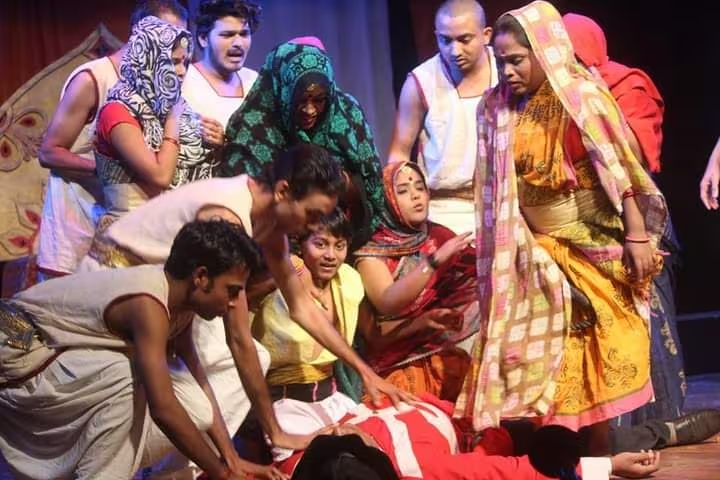Assam’s Unsung Hero Rediscovered on Stage
Context
Malati Mem, a multilingual play based on the life and revolutionary fervour of Mangri Orang, an Adivasi with roots in central India, was presented on August 29 by the North East Regional Centre (NERC) of the Indira Gandhi National Centre for the Arts (IGNCA). Her nickname among her fellow plantation workers was Malati Mem; the second term is a shortened version of memsahib.
What do we know about Malati Mem?
- Identity and background:
-
-
- Malati Mem was an Assamese tribal woman also known as Mungri.
- During the colonial era, she toiled on tea plantations in the Darrang area of Assam.
-
- Anti-Opium Campaign:
-
-
- Malati Mem gained notoriety for her involvement in anti-opium initiatives.
- These campaigns were a part of the Swadeshi movement, during which Indians boycotted products created outside, such as opium and alcohol.
-
- Participation in the Swadeshi Movement:
-
-
- She vigorously opposed the promotion and use of opium and foreign liquor on the tea plantations during the Swadeshi movement.
- Her participation in these activities demonstrated how committed she was to the cause of Indian independence.
-
- Martyrdom:
-
-
- Tragically, Malati Mem was killed in 1921 by colonial authorities during a confrontation.
- She perished while taking part in the non-cooperation movement, becoming a personification of the struggle against British colonial control.
-
- Assam’s first female martyr:
-
-
- Malati Mem has the honour of being acknowledged as the first Assamese woman martyr.
- This historical honour was bestowed upon her in recognition of her bravery and sacrifice in the struggle against British control.
-
- Legacy:
-
-
- The narrative of Malati Mem serves as a reminder of the contributions of common people who were essential in India’s struggle for independence.
- People are still motivated by her memory, which also draws attention to the contributions made by several unsung heroes during this crucial era in India’s history.
-
- Historical Significance:
-
-
- Malati Mem’s life and her role in the anti-opium campaigns reflect the broader anti-colonial sentiment among the tea plantation workers in Assam.
- Despite being illiterate and marginalized, she and others actively participated in the Indian independence movement.
-
- Recognition through Theater:
-
- In recent times, Malati Mem’s story gained renewed attention through a multilingual play titled “Malati Mem.”
- This play was directed by Pari Sarania and aimed to showcase the contributions of icons from the northeastern region on a national stage.
What do we know about the Anti Opium movement in Assam during the time of Independence?
The Assamese anti-opium movement was a part of the larger Swadeshi movement and the Indian independence fight against British colonial control. Opium, a narcotic drug that was being pushed and benefited from by the British colonial government, was the main focus of opposition to its production, sale, and consumption. The following are the main facets of the anti-opium movement in Assam:
- Colonial Opium Monopoly: In India, opium production and distribution were monopolized by British colonial authority. Opium was a major source of income for the British Raj and was farmed and processed in some areas, notably parts of Assam.
- Economic exploitation: In Assam, tribal peoples and employees of tea plantations frequently participated in the cultivation of opium. These groups were exploited economically and coerced into growing opium for the British administration.
- Health and Social Issues: The push against opium was propelled by worries about the effects that opium use would have on one’s health and social life. Opium addiction harms people’s health, their families, and their communities, causing social breakdown.
- Part of the Swadeshi Movement: The Assamese anti-opium movement was intimately associated with the Swadeshi boycott of British goods and the promotion of items created in India. The movement worked to stop the manufacture and use of opium because it considered it a representation of British economic exploitation.
- Local Leadership: Local leaders and activists in Assam, including individuals like Malati Mem, were instrumental in guiding the movement against opium. Particularly well-known for her commitment to this cause was Malati Mem.
- Protests and Resistance: The anti-opium movement included a variety of protest and resistance tactics, such as petitions, rallies, and public awareness campaigns concerning the drug’s negative consequences.
- Martyrdom: Some of the movement’s activists suffered greatly as a result of their resistance. For instance, Malati Mem was martyred in 1921 while taking part in the movement of non-cooperation against opium and British control.
- Impact and Outcome: While the anti-opium movement in Assam did not eliminate opium production and consumption, it did raise awareness about the issue and contributed to the larger struggle for Indian independence. The movement drew attention to the exploitative economic policies of the British colonial administration.





